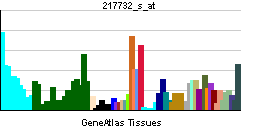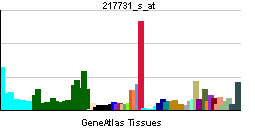ITM2B
| Integral membrane protein 2B | |||||||||||
|---|---|---|---|---|---|---|---|---|---|---|---|
| Identifiers | |||||||||||
| Symbols | ITM2B ; ABRI; BRI; BRI2; BRICD2B; E25B; E3-16; FBD | ||||||||||
| External IDs | Template:OMIM5 Template:MGI HomoloGene: 7388 | ||||||||||
| |||||||||||
| RNA expression pattern | |||||||||||
 | |||||||||||
 | |||||||||||
| More reference expression data | |||||||||||
| Orthologs | |||||||||||
| Template:GNF Ortholog box | |||||||||||
| Species | Human | Mouse | |||||||||
| Entrez | n/a | n/a | |||||||||
| Ensembl | n/a | n/a | |||||||||
| UniProt | n/a | n/a | |||||||||
| RefSeq (mRNA) | n/a | n/a | |||||||||
| RefSeq (protein) | n/a | n/a | |||||||||
| Location (UCSC) | n/a | n/a | |||||||||
| PubMed search | n/a | n/a | |||||||||
Integral membrane protein 2B, also known as ITM2B, is a human gene.[1]
References
Further reading
- Rostagno A, Tomidokoro Y, Lashley T; et al. (2005). "Chromosome 13 dementias". Cell. Mol. Life Sci. 62 (16): 1814–25. doi:10.1007/s00018-005-5092-5. PMID 15968464.
- Ernst B, Dalby MA, Dalby A (1970). "Luria testing in demented patients". Acta Neurol. Scand. 46: Suppl 43:97-8. PMID 5466275.
- Pittois K, Deleersnijder W, Merregaert J (1998). "cDNA sequence analysis, chromosomal assignment and expression pattern of the gene coding for integral membrane protein 2B". Gene. 217 (1–2): 141–9. PMID 9795190.
- Vidal R, Frangione B, Rostagno A; et al. (1999). "A stop-codon mutation in the BRI gene associated with familial British dementia". Nature. 399 (6738): 776–81. doi:10.1038/21637. PMID 10391242.
- Vidal R, Revesz T, Rostagno A; et al. (2000). "A decamer duplication in the 3' region of the BRI gene originates an amyloid peptide that is associated with dementia in a Danish kindred". Proc. Natl. Acad. Sci. U.S.A. 97 (9): 4920–5. doi:10.1073/pnas.080076097. PMID 10781099.
- Hu RM, Han ZG, Song HD; et al. (2000). "Gene expression profiling in the human hypothalamus-pituitary-adrenal axis and full-length cDNA cloning". Proc. Natl. Acad. Sci. U.S.A. 97 (17): 9543–8. doi:10.1073/pnas.160270997. PMID 10931946.
- Fleischer A, Ayllón V, Dumoutier L; et al. (2002). "Proapoptotic activity of ITM2B(s), a BH3-only protein induced upon IL-2-deprivation which interacts with Bcl-2". Oncogene. 21 (20): 3181–9. doi:10.1038/sj.onc.1205464. PMID 12082633.
- Austen B, el-Agnaf O, Nagala S; et al. (2003). "Properties of neurotoxic peptides related to the BRI gene". Biochem. Soc. Trans. 30 (4): 557–9. doi:10.1042/ Check
|doi=value (help). PMID 12196136. - Strausberg RL, Feingold EA, Grouse LH; et al. (2003). "Generation and initial analysis of more than 15,000 full-length human and mouse cDNA sequences". Proc. Natl. Acad. Sci. U.S.A. 99 (26): 16899–903. doi:10.1073/pnas.242603899. PMID 12477932.
- Akiyama H, Kondo H, Arai T; et al. (2004). "Expression of BRI, the normal precursor of the amyloid protein of familial British dementia, in human brain". Acta Neuropathol. 107 (1): 53–8. doi:10.1007/s00401-003-0783-1. PMID 14586629.
- Choi SI, Vidal R, Frangione B, Levy E (2004). "Axonal transport of British and Danish amyloid peptides via secretory vesicles". FASEB J. 18 (2): 373–5. doi:10.1096/fj.03-0730fje. PMID 14656991.
- Gerhard DS, Wagner L, Feingold EA; et al. (2004). "The status, quality, and expansion of the NIH full-length cDNA project: the Mammalian Gene Collection (MGC)". Genome Res. 14 (10B): 2121–7. doi:10.1101/gr.2596504. PMID 15489334.
- Matsuda S, Giliberto L, Matsuda Y; et al. (2005). "The familial dementia BRI2 gene binds the Alzheimer gene amyloid-beta precursor protein and inhibits amyloid-beta production". J. Biol. Chem. 280 (32): 28912–6. doi:10.1074/jbc.C500217200. PMID 15983050.
- Fotinopoulou A, Tsachaki M, Vlavaki M; et al. (2005). "BRI2 interacts with amyloid precursor protein (APP) and regulates amyloid beta (Abeta) production". J. Biol. Chem. 280 (35): 30768–72. doi:10.1074/jbc.C500231200. PMID 16027166.
- Ghiso J, Rostagno A, Tomidokoro Y; et al. (2006). "Genetic alterations of the BRI2 gene: familial British and Danish dementias". Brain Pathol. 16 (1): 71–9. PMID 16612984.
| This protein-related article is a stub. You can help Wikipedia by expanding it. |